- About
- Visiting
- What’s On
- Venue hire
- Catalogues
- Collections
- 101 Treasures of Chetham’s
- Digital Resources
- The Flowers of Histories
- A Book of Hours from France
- The Manchester Scrapbook
- Thomas Barritt of Manchester
- Art Treasures Examiner of 1857
- Manchester Association for Constitutional Order
- The North Western Museum of Science and Industry: Some Reminiscences by Richard Hills
- Criminal Manchester
- The Cup of Destiny
- Athenaeum Souvenir
- Middle English Manuscripts
- Manchester and Liverpool of Today
- Hollingworth’s Mancuniensis
- Memoir of Cecil Wray
- William Seward’s Diary
- The Anti-Monopolist
- Fishwick’s History of Rochdale
- Knyvett’s Defence of this Realm
- Tractatus de Nigromantia
- Axon Ballads
- Printed Books & Ephemera
- Archives & Manuscripts
- Prints and Photographs
- Blog
- Support us
Political Cartoons
Political Propaganda in Manchester – Poster Cartoons of 1876
A guest piece written by Rachelle Beckett, History undergraduate at Manchester Metropolitan University, with an introduction by Senior Lecturer Terry Wyke.
Political cartoons were hardly new in 1876. However, Chetham’s Library holds a group of rare political cartoons relating to the parliamentary by-election held in Manchester in that year.
These cartoons do not appear to have been published in either newspapers, magazines or as prints. Rather they were printed to be pasted up on the city’s walls and displayed at political meetings during the campaign.
As was, and is, the case with so much political ephemera little is known of either the artists or printers, or its place amongst the other forms of persuasion that comprised political campaigning in the 1870s. Such ephemera was not generally saved, rarely finding its way into public libraries and archives.
The Great Prize Fight (1876)
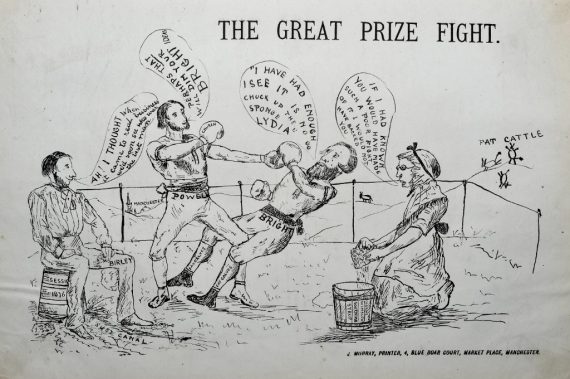
This Conservative-inspired and crudely drawn cartoon uses the metaphor of a boxing match to portray the upcoming Manchester by-election in February 1876. It shows the Conservative candidate Francis Sharp Powell knocking down the Liberal candidate, Jacob Bright. Hugh Birley, the sitting Conservative MP for Manchester, is Powell’s second and is suitably seated. Bright’s second is Lydia Becker who is shown on her knees wringing out a sponge in a bucket containing popular opiate-based soothing syrup. Bright’s support of Becker and her progressive ideas of female suffrage was anathema to the Conservatives. The cartoon appears not to have been published in a newspaper or magazine but was probably pasted on the walls as a poster as part of the campaign.
Political Eclipse (1876)
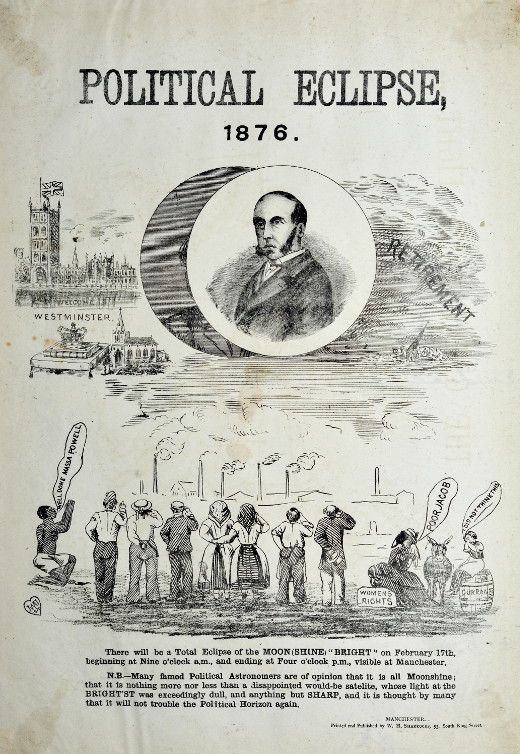
This cartoon, published during the 1876 election campaign, uses the eclipse to convey the idea that Bright will be defeated by Powell. Here, Powell is presented as the sun eclipsing the moon, which represents Bright. Bright won the election by over 1500 votes.
Don Jacob Rideth His Hobby (1876)
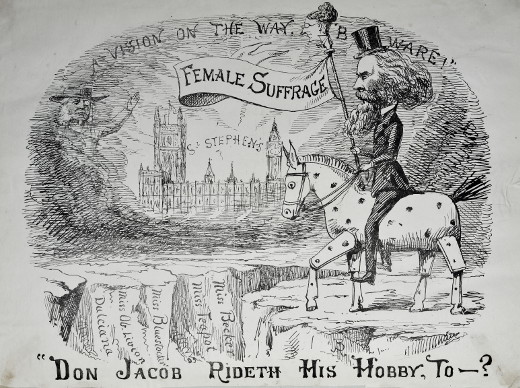
This Conservative cartoon is undated but clearly mocks either Bright’s actual return or his intention to return to parliament. Here he is shown mounted on his hobby horse – the campaign for female suffrage, an idea that even in the 1870s many regarded as only fit for ridicule. The lance and banner he is holding is topped with the head of Lydia Becker whose name also appears, along with other feminine references – Miss Teapot, Miss Bluestocking – on the face of the ravine at his feet. The title also suggests Don Quixote, the comic and mentally unhinged hero whose ridiculous quests were made famous in Cervantes’ novel.
The City Steeplechase (1876)
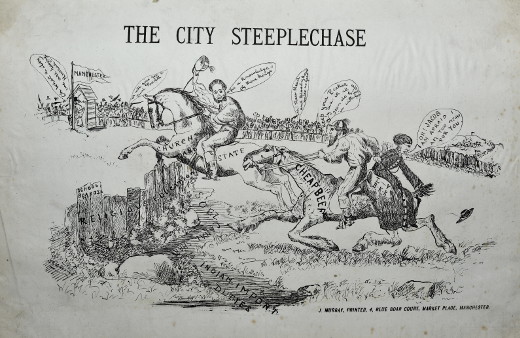
Another Conservative cartoon, this time depicting the 1876 by-election as a steeplechase. Powell, who was unknown to the Manchester electorate, is shown riding a powerful stallion, triumphing over a feeble Bright who is mounted on a horse that looks as if it is on the way to the knackers’ yard. It struggles to carry both Bright and his additional weight in the form of Lydia Becker, reminding those who need reminding that Bright had been among the most prominent supporters of the idea of female suffrage when it had been raised by Becker and others in the 1860s. Meanwhile Powell, the traditional Conservative, safely clears the current obstacles of religious education in the new Board Schools (Becker was elected as a member of the Manchester School board in 1870), cotton duties and the finances of the Suez Canal.
The Manchester Spelling Bee (1876)
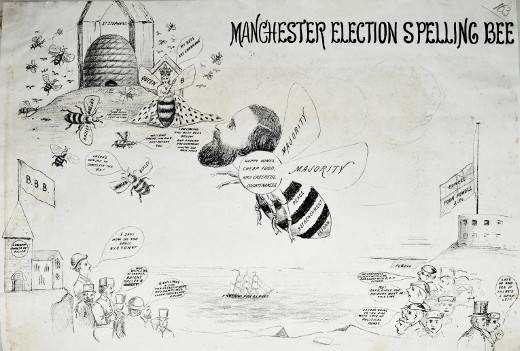
This cartoon comments on the result of the 1876 by-election. Firstly the election is symbolised by a spelling bee, a competition that originated in America but which in 1875 became a craze across England – the Free Trade Hall in Manchester held one of the district’s largest competitions. Bright having defeated Powell is seen returning to the Westminster hive where he will join the other two Manchester B’s – Thomas Bazley (Liberal MP) and Hugh Birley (Conservative MP). Powell’s supporters are left defeated, their campaign of ‘Beer, Bible and Bribery’ having not won the day against Bright’s reforming policies. There may be an allusion also to Lydia Becker as the Queen Bee, another reminder of Bright’s support for her radical suffrage ideas.
In at the Finish (1874)
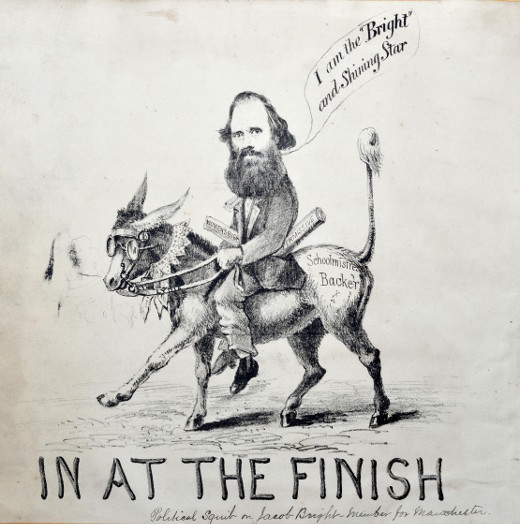
This cartoon provides a satirical portrait of Jacob Bright and Lydia Becker during the 1874 general election in which Bright lost his seat as Liberal MP for Manchester. Similar to the other cartoons that attack Becker and Bright, this illustration shows him riding a donkey rather than a horse. Bright’s appearance is dishevelled which suggests his lack of credibility as a political figure. The bespectacled donkey wearing a lace collar is clearly meant to represent Becker, a further reminder of the ridicule that her campaigning for womens’ rights attracted at this time.
